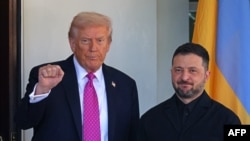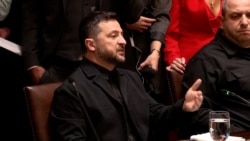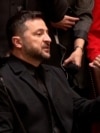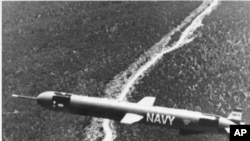US President Donald Trump appeared to cool to the idea of supplying Ukraine with Tomahawk missiles after he met with Ukrainian President Volodymyr Zelenskyy at the White House on October 17, saying afterward that the two sides should simply "stop the killing, and make a DEAL!"
Trump welcomed Zelenskyy to the White House for the third time this year, saying before their meeting that he hoped the war would end without the United States providing Tomahawks, which have been discussed in recent weeks as a potential game-changer in the course of the war.
"Hopefully they won't need it. Hopefully we'll be able to get the war over without thinking about Tomahawks," he told reporters before the two leaders held talks over lunch.
Later on October 17, Trump said on Truth Social that the meeting was "interesting and cordial," but said he had told both Zelenskyy and Russian President Vladimir Putin that the war should end immediately.
"Enough blood has been shed, with property lines being defined by War and Guts. They should stop where they are. Let both claim Victory, let History decide!" Trump said.
The comments contrast with Trump's statements last month when he suggested that Kyiv's military was capable of expelling Moscow's forces from all its territory.
During a lengthy question and answer session with reporters, Trump and Zelenskyy were questioned about a potential deal in which Ukraine would provide US military production with drone technologies in return for Tomahawks.
In a press conference after their meeting, Zelenskyy confirmed that the leaders discussed Tomahawks and Ukrainian drones, but neither Trump nor Zelenskyy shared any details on the potential deal in their post-meeting comments.
Asked if he left the meeting more or less optimistic about the chances of the United States giving Tomahawks, Zelenskyy said, "I'm realistic."
"We decided that we don't speak about it because nobody wants -- I mean, the United States doesn't want -- escalation," Zelenskyy said.
The Ukrainian president said during the session with reporters that his country has "thousands" of drones, but "doesn't have Tomahawks."
"[It] is another, technological, war. You don't just use Tomahawks. If you want to target a military goal, you need thousand of drones. It goes together," he said.
When asked if the United States was interested in Ukrainian drones, Trump responded: "We are." He then suggested that Ukraine makes "a very good drone."
On the eve of Zelenskyy’s visit to Washington, Trump announced that he and Putin has spoken by phone -- a call made at the Kremlin's request -- and had agreed to a possible Budapest summit between the two leaders.
Speaking opposite Zelenskyy at the White House meeting, Trump said Putin "wants to end the war," while the Ukrainian president said Putin doesn't want peace and called for more pressure to be put on the Kremlin to bring it to the negotiating table.
Trump, asked if he was concerned that the Russian president could be trying to buy more time for Moscow's war efforts, Trump said, "Yeah, I am."
"I’ve been played all my life by the best of them, and I came out really well. So it's possible, yeah, a little time, it's all right," Trump said. "But I think he wants to make a deal."
To some observers it appeared that Trump's policy had been directed by Putin.
“We’ve seen this movie before and I wish I could say this time it’s going to be different, but there is absolutely no reason to believe it’s going to be different,” former US diplomat Richard Haass told CNN.
“Trump is right to want peace. He’s right to press for it, but his own policy is undermining his own goal because he’s not putting enough pressure on Vladimir Putin, who continues to believe that time is on his side,” Haass added.
The surprise conversation between Trump and Putin caught the Ukrainian delegation in Washington off guard, as it was seeking the sale of US-made missiles and air-defense systems amid Russia’s relentless attacks on the country’s civilian and energy infrastructure.
Moscow has previously warned Washington not to provide Ukraine with Tomahawks, with Putin saying that such deliveries would represent a "completely new stage of escalation" between the United States and Russia.
On October 17, Hungarian Prime Minister Viktor Orban -- one of Putin’s only allies in the EU -- also spoke with the Russian leader, pledging full cooperation to host any possible summit in Budapest.
"Preparations are going full steam ahead!" he said in a Facebook post, appearing to signal that Hungary would not seek to arrest Putin under the International Criminal Court’s arrest warrant.
European Commission spokesman Olof Gill told reporters in Brussels that the bloc welcomes "any meeting that moves forward the process of achieving a just and lasting peace for Ukraine."
Trump, who took office pledging to end the Ukraine war within 24 hours, has been repeatedly frustrated by the lack of progress in reaching even a cease-fire, let alone a lasting peace treaty.
In addition to his first summit with Putin in Alaska in August, the two have spoken by phone at least eight times, while White House envoy Steve Witkoff has met with Putin in Moscow at least five times.
Trump’s position toward Putin -- and toward Moscow’s war overall -- has shifted perceptibly in recent months as Russia continues to grind forward on the battlefield and batter Ukrainian cities and towns, including their electricity grid and natural gas infrastructure.














